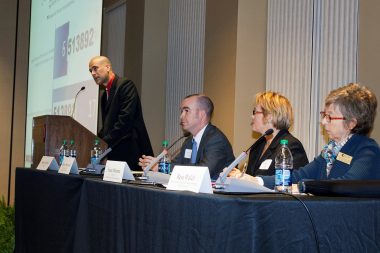More than 200 students, faculty, staff, health care employees and community members participated in the conversation hosted by Elon in partnership with the Burlington Times-News.
 Health care reform was the topic that Elon University tackled Monday evening in the first of three “Community Connections” programs planned for this year.
Health care reform was the topic that Elon University tackled Monday evening in the first of three “Community Connections” programs planned for this year.
But expert panelist Preston Hammock, Alamance Regional Medical Center’s president and chief operating officer, was the first to mention a new word—redesign—to describe what he thinks needs to happen to health care in this country.
“I think redesign is important, instead of reform,” Hammock said. “… From a redesign standpoint, it really forces us to think, ask and even learn in new and meaningful ways.”
Hammock, along with Susan Osborne, the director of the Alamance County’s Department of Social Services, and Resa Walch, senior lecturer in Elon’s Department of Health and Human Performance, were the panel of experts at the forum held in McKinnon Hall Nov. 4. Kenn Gaither, associate dean of the School of Communications, was the moderator.
More than 200 students, faculty, staff, health care employees and community members participated in the conversation that Elon hosted in partnership with the Burlington Times-News. The audience was encouraged to ask questions as well as give their own opinions to “Poll Everywhere” via text or Twitter.
In addition to the industry experts, nine community panelists, including a physician, a longtime psychiatric nurse and several Elon students, shared their views about health care reform.
“My personal point of view is that we in the U.S. have a moral responsibility to provide affordable basic health care to every member of our society,” said Dr. Ginette Archinal, a native Australian and family practice physician who works at Elon’s student health center.
“I also believe that from a purely economic standpoint we need to provide affordable, accessible basic health care to everyone,” Archinal said. “… I believe that we are tackling the reform of health care without acknowledging why it needs to be reformed. I regard health care as a right and not a privilege.”
Miles Grunvald ’14, who plans to attend medical school next year, said his view on health care is shaped by his experiences in Vermont, where he was raised.
“Any comprehensive health care system must address the fact that Americans are living in ways that are unhealthy and unsustainable,” Grunvald said. “These lifestyles are impacting and will continue to impact our society as a whole. Making health a national priority and refocusing discussions on how we can raise healthier kids should be considered of the highest importance.”
 Maria Restuccio ’15, an economics major, doesn’t think the country can support a privatized health care system and raised several questions about equity in regard to providing a socialized system of health care.
Maria Restuccio ’15, an economics major, doesn’t think the country can support a privatized health care system and raised several questions about equity in regard to providing a socialized system of health care.
“Is it fair that I, as a hardworking, healthy taxpayer, have to front the bill for someone who cannot afford their health care?” Restuccio asked. “Also, what is the overall benefit to society of providing universal health care? Is the healthy workforce worth the extra cost? These are economic questions that seem very difficult to both quantify and answer.”
The way health care is accessed and delivered has needed revamping, Hammock said. When hospital officials used to gather for strategic planning sessions, the focus was on how to increase use of the hospital. That mindset is changing so that health care centers on the patient rather than the hospital.
“We spend too much money on health care in this country,” Hammock said. “The hospital is the most expensive place to get health care. To fix this, we have to keep people out of the hospital.”
About 16 percent of Alamance County residents—and 26 percent of children—are living below the poverty level, said Osborne, who tried to dispel some myths about Medicaid. She explained that an adult, who is not elderly and doesn’t have a child or a disability, doesn’t qualify for that type of government assistance.
“Only 30 percent of low-income adults are covered by Medicaid,” she said and emphasized that importance of health care reform so that more people will have access to mental health programs.
“If you don’t have insurance, you just can’t go and get mental health treatment and ongoing care,” Osborne said.
Walch reminded the group that any change, especially a major one, takes time to perfect and the Affordable Care Act needs tweaking.
“Yep. They didn’t get it right when they rolled it out,” she said, adding that every major piece of legislation throughout history has “met bumps in the road.”
“And we did our darn best to figure it out,” Walch said.
Other “Community Connections” forums are tentatively scheduled for January and April.


